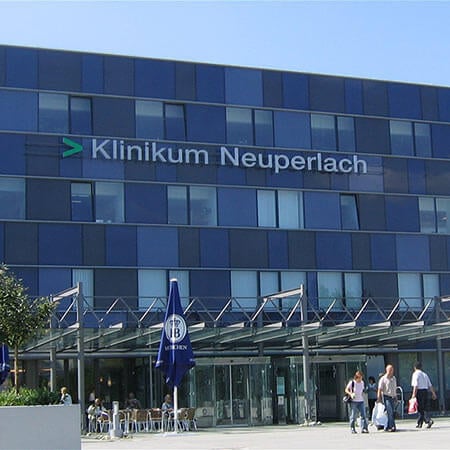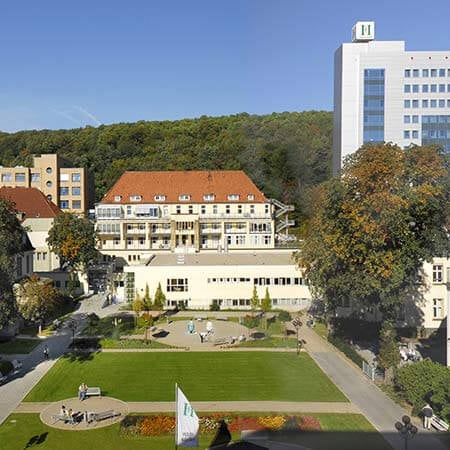Menstrual disorders
Menstrual cycle represents physiologic cyclic changes of the female endocrine profile. Menstrual cycle includes the functional activity of the reproductive organs associated with the release of a mature ovum from the ovary. Menstrual disorders are common in women of a reproductive age.
The Booking Health portal presents 49 German clinics specializing in menstrual disorders treatment
Show all clinics
Menstrual disorders – Diagnostics
In modern European hospitals a comprehensive diagnosis is performed to identify causes of menstrual disorders and essence of reproductive system changes.
Comprehensive diagnosis includes the following techniques:
- Ultrasound of the reproductive organs, abdominal cavity, thyroid gland
- Colposcopy, which is an examination of the vagina and cervix using an optical device called colposcope
- Laboratory exclusion or confirmation of various infections, including sexually transmitted diseases
- Microscopy and bacteriological culture of the smear from the vagina and cervix
- Biopsy of the uterine cervix whereby a tissue sample is taken for a histological microscopic examination
- PAP test – microscopic examination of the smear, which helps to exclude precancerous conditions and malformations
- Laboratory determination of various hormones level in the blood
Choice of the technique is done individually for each woman. A doctor takes into consideration her age, presence of concomitant somatic pathology and the nature of menstrual disorder.
Best clinics for the menstrual disorders diagnostics in Germany:
Menstrual disorders – Treatment
Therapy program is prescribed by a doctor after the comprehensive diagnostics. There are several types of treatment that are possibly used depending on a pathological condition:
- Conservative therapy (antibiotics, hormonal medicines)
- Physical impact techniques, which are applied on the mucous membrane of the cervix in case of certain malformations (cryodestruction, laser therapy, methods of radiowave surgery)
- Hysteroresectoscopy (endoscopic surgical methods for the malformations removal from the uterus)
- Laparoscopic cauterization of the ovaries, which is used for polycystic ovary treatment
There is no single treatment program. Menstrual disorders include a wide group of symptoms evidencing various diseases. Besides, not all of them imply reproductive organs issues. These can be problems with the liver, thyroid gland, brain, haematopoietic system. Thus, therapy is selected based on the underlying disease.
If the only purpose of treatment is to get pregnant, a woman is prescribed a treatment for ovulation stimulation. It is possible to achieve conception within a few cycles. If conservative treatment of infertility doesn’t bring any effect, then in vitro fertilization is performed.
Best clinics for the menstrual disorders treatment in Germany:

Hospital Neuperlach Munich

University Hospital of Ludwig Maximilian University of Munich

HELIOS University Hospital Wuppertal
Menstrual disorders – Rehabilitation
Rehabilitation is the process of body restoration from injuries, surgeries or diseases. It can have a different orientation such as: oncological, orthopedic, neurological, etc. There is also general therapeutic rehabilitation. It is indicated for patients after conservative and surgical treatment of the internal organs diseases.
The directions of the general therapeutic rehabilitation
There are several main directions of the therapeutic rehabilitation such as:
- Medical one, which includes the restoration of patient's health, normalization of body functions, stimulation of compensatory possibilities, elimination of the chronic pain, etc.
- Physical one, which is responsible for improving of work capacity and tolerance for physical activities. In the complex cases, the purpose of this therapeutic rehabilitation area may be the restoration of the self-service ability.
- Psychological one, which helps to eliminate the mental disorders which may occur as a result of a disease (phobias, depression, apathy), to increase the human motivation, and to adapt to the changed living conditions.
The World Health Organization underlines 3 phases of rehabilitation such as: hospital phase, a phase of recovery and supporting phase. Different tasks are solved in different phases. The hospital phase is conducted immediately after the treatment. After the first phase begins the second one which usually takes place in sanatoriums or rehabilitation centers. This is the boundary between two periods, namely illness and future life. Then a supporting phase is required. The patient maintains the achieved level of his health and physical activity at home or visits the rehabilitation center from time to time.
Therapeutic rehabilitation methods
The most modern rehabilitation programs are used in Germany. They are adapted individually for each patient, and are based on the recent disease, age, physical possibilities, and the results of treatment. Different specialists such as: therapists, psychologists, rehabilitators, kinesiotherapists, physiotherapists are involved in the rehabilitation process.
The following methods of rehabilitation are used:
- Dosed physical activity
- Training on the simulators and in the pool
- Physiotherapy
- Acupuncture
- Manual therapy
- Microcurrent therapy
- Compression therapy
- Lymphatic drainage
- Natural factors of the nature (mud, thermal waters, etc.)
Any rehabilitation may include medicamentous support. It is necessary to hold a consultation with the patient about the proper nutrition and the way of life which is important for him in the current situation.
Rehabilitation programs in Germany are designed for 2 weeks. If necessary, they can last much longer. In this country, the patient is provided with qualitative care, accommodation in comfortable rooms and individually selected meals.
Rehabilitation programs in Germany show one of the best results in the world. Most patients successfully restore their employability and excellent health there. They remain physically active, return to the full social and family life.
Best clinics for general therapeutic rehabilitation in Germany:
Author:
The article was edited by medical expert, board certified Dr. Nadezhda Ivanisova. For the treatment of the conditions referred to in the article you must consult a doctor; the information in the article is not intended for self-medication!
Source:
The cost of services includes
Here you can find the cost of treatment for this disease at the German University Hospitals. Leave a request and we will provide a free consultation with a doctor and will start organizing the whole treatment process.
The program includes the following:
- Issuing of an invitation for getting a visa for treatment as quick as possible
- Fixing an appointment at a time convenient for you
- Preliminary organization of a comprehensive examination and discussion of the forthcoming treatment plan
- Arranging transfer from the airport to the hospital and back to the airport
- Provision of interpreting services and services of a personal medical coordinator
- If necessary, assistance in the organization of further surgical treatment
- Provision of a medical insurance against treatment complications covering up to 200,000 euro
- Preparation and translation of medical records and recommendations from the hospital
- Assistance in the subsequent communication with your attending physician, including consultations on repeated X-ray images through the unique medical document management system E-doc


